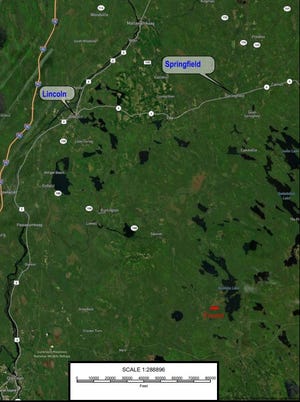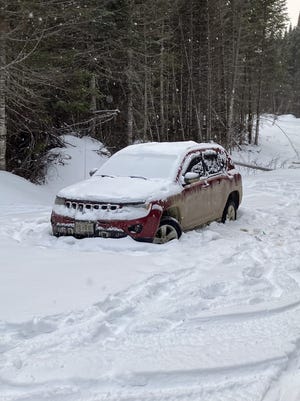[ad_1]
- Two Maine women set out to visit the Maine Mall on Feb. 21.
- The women got lost and then their vehicle was stuck in snow on an unplowed road.
- They spent days inside the SUV before they were rescued Sunday.
Two Maine women spent days trapped in a snow-covered SUV as temperatures plummeted to -15 degrees before search crews found them safe this week.
Kimberly Pushard and Angela Bussell were headed to the Maine Mall on Feb. 21, about 30 miles from where they live in Topsham, Maine, said Topsham Police Chief Marc Hagan.
The women were traveling in a red 2012 Jeep Compass when they got lost and became the subjects of an alert for missing vulnerable adults. The SUV eventually got stuck in deep snow, forcing the women to spend multiple nights inside the truck.
Officials were able to get videos from local businesses as the women stopped on their trip and to track their cell phone movement.
On Sunday, a warden from the Maine Department of Inland Fisheries & Wildlife found the women inside the SUV on an unplowed road.
They were taken to a hospital for medical evaluation. Bussell was released from the hospital Sunday night and is back home. As of Tuesday afternoon, Pushard was still hospitalized, Hagan said.
Survival: He was lost at sea for 24 days. Ketchup, seasoning and rainwater helped him survive.
What happened to the women?
The women called their families around 2:30 p.m. Feb. 21 to say they were lost, Hagan said.
“They were down in Massachusetts,” he said . “The family apparently got them turned around and they were headed north again.”
Along the way, they asked multiple people for directions, including a man who helped them when they ran out of gas and an officer in Exeter, New Hampshire who gave them directions.
They also called police dispatchers before their phone died.
At some point, they met a New Hampshire state police officer who had them follow him onto I-95, Hagan said.
But when the women still didn’t come home on the morning of Feb. 22, the family contacted Topsham police.
Topsham police contacted officials in New Hampshire, who conducted a phone ping and saw that the women were near a town named Candia, Hagan said. New Hampshire State Police put out a missing vulnerable adult alert for the women, who police said had intellectual disabilities.

Finding the women was difficult because of their mobility, officials say
Hagan estimates the women drove at least 300 miles on their journey and said they were quite difficult to track because they were so mobile.
Aaron Cross, a lieutenant with the Maine Warden Service, said the women traveled throughout a wide area within a matter of days. Because some roads are hard to get to, the warden service used snowmobiles and even an aircraft to look for them.
Game Warden Brad Richard was on a snowmobile and was tasked with checking roads and trails for the missing women.
“He rode about 90 miles that day on a snowmobile, covering different roads,” Cross said.
Close to 4 p.m. on Feb. 26, he still had a few trails to check. He found a snowmobile trail with a hard turn and spotted vehicle tracks that looked like they had been covered by recent snowfall.
That’s when he found the SUV.
“They did get off on the snowmobile trail and they ended up on an unplowed woods road,” Cross said. “That’s ultimately where they got their vehicle stuck … The vehicle was pretty much completely covered in snow.”

Richard called out to see if anyone was inside and after about five seconds, the door opened. When he asked one of the occupants if her name is Kim, she responded “How do you know my name?”
Richard told Pushard everyone had been looking for her.
By this point, the women were very cold and the soda bottle in their vehicle was completely frozen solid. The warden who found them needed to go find a phone signal to call for help but he left them with the food he had left in his backpack.
The women are very lucky, officials say
Cross said these situations often have sad outcomes because people begin to panic and leave their vehicles to hike through the woods.
The elements can be dangerous to take on.
“They stayed with the vehicle … they were able to at least have shelter and a somewhat warm or place, at least out of the wind, to hunker down,” he said.
He also said technology is helpful in these situations because it can aid in searches, whether it’s a phone, watch or GPS system.
“Have a phone,” Cross said. “Keep it on. Keep it with them. Make sure you have a charger … It’s a huge piece of the puzzle when we do have phone coordinates that we can go off of and we can track people to make sure we know where to put searchers.”
Saleen Martin is a reporter on USA TODAY’s NOW team. She is from Norfolk, Virginia – the 757 – and loves all things horror, witches, Christmas, and food. Follow her on Twitter at @Saleen_Martin or email her at [email protected].
[ad_2]
Source link
